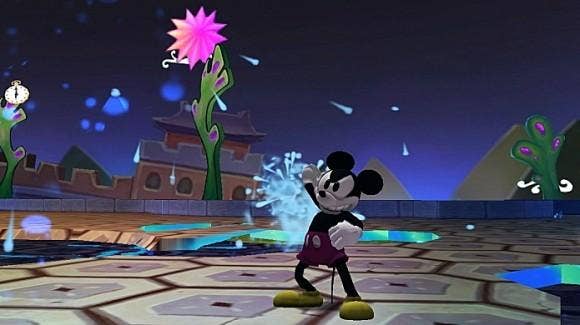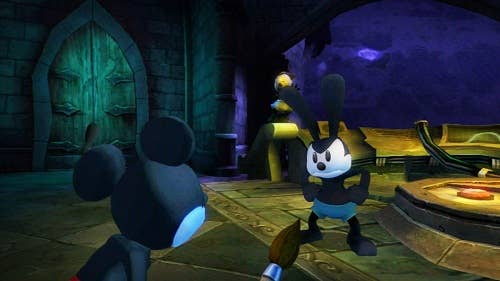Warren Spector: A Lifetime of Achievements
In this massive interview, the veteran designer talks about his career and design philosophies
Warren Spector ranks among the best game designers of the last two decades. Along with names like Will Wright and Sid Meier, Spector represents the old guard of games development. His years of experience have given him a unique perspective on this modern era of gaming.
Spector started out as a magazine editor and role-playing game designer in the '80s before he entered the computer games business, working with Origin Systems and Looking Glass Studios on titles like Ultima Underworld and System Shock. He's perhaps best known for founding Ion Storm and developing Deus Ex games.
In 2007, Spector's Junction Point Studios was acquired by Disney and he created Epic Mickey for the Wii. The day after Spector was graced with a Lifetime Achievement Award at GDC last week, GamesIndustry International sat down with the affable designer to pick his brain on... well, everything.
No, it does not get old hat. This one in particular is pretty incredible. I'm still in a "what world are we living in" frame of mind.
Yeah, it's hugely emotional. To be recognized for an individual game is amazing; I've always said "I don't care about awards, they don't mean anything" until I won some and then all of a sudden they start meaning a lot more. You realize how cool it is to be recognized by your peers. And then to be recognized by your peers for a body of work, I mean it's like-I'm going to start to tear up now actually. I've been doing this for 29 years, and I guess it made a difference. That's a pretty powerful thing.
"I think over the next 3 to 5 years, you're going to see lots of people changing the way they approach consoles. I don't know that console gaming will ever go away"
Warren Spector
Well, it is a little weird when lifetime achievement awards are given to people who still have time on their contracts, let alone in their careers. I remember when Hal Roach won the lifetime achievement award at the Oscars and he was like 97 or something and could barely walk out on stage. Ok, that's a guy who probably needs the lifetime achievement stuff, but I hope I still have plenty more to do. There's certainly a lot of games up here in my head that I would like to get out before I'm done. So, I don't think I'm done.
I will say we're a very young industry, even now. I joke - but only half-jokingly - that I'm probably the oldest person still actively involved in game development. I'm actually helping make the games and I'm going to be 57 this year, and that probably does make me one of the oldest people still working. And I have, I admit, spent more time in the last three or four years thinking about the word legacy, which is kind of weird. And have I left enough behind, have I made a difference? So it's nice to get that validation, that helps a lot. But also I've been thinking a lot about the next generation [of designers]. That guy you met a few minutes ago, Paul Weaver, my studio director, I'm thinking a lot more about how do I not just leave something behind but sort of help him take the next steps in his career. Chase Jones, who's a guy we just promoted to game director, he's actually directing the next game we're doing - which I can't say what it is - how do I help them replace me?
So I think a lot more about that. The word mentoring never really was something that was in the forefront of my mind until recently. So legacy and mentoring are kind of the games I'm playing right now, more than the "I'm going to play the next Toy Story game" or something.
Yeah, I think there's a better than even chance that when I hang up the game development mantle I'll head to a university and do some teaching. Who knows really what'll happen, but that's certainly in my thoughts. You know, I've been lucky enough... I actually taught several courses at the University of Texas when I was working on my doctorate. I did a video shoot- I was interviewed on camera last week in Austin and the guy behind the camera, as he was breaking down this set we were on, he said, "You know you were my professor at UT." He'd been in my animation class and that was a pretty cool moment; that I made a difference in that guy's life.
And at the awards show the other night, you know lots of people were congratulating me and saying "hey, thanks a lot", and there was one kid who came up to me and said, "I was in your videogames master class at the University of Texas in 2007 and I took it as kind of a lark and it made me want to make videogames. And so that's why I'm in the videogame business now."
That's pretty cool. When you realize you can actually affect people's lives through the games you make and through the work you do? That's about as special as getting a lifetime achievement award.

Is it the same business? I don't think so!
I think there are a couple things. One is I would say find your passion; find the thing you're passionate about and pursue that. If you get into gaming just because you want a paycheck or you say, "I don't care I'm just going to get a job anywhere," it'll burn you out. Game development is a pretty intense endeavor, and you really have to love what you're doing or it'll kill you. So, I'd say find what you're passionate about and find a way to do what you're passionate about. That's the most important thing.
The other thing that sometimes takes people by surprise is - I always advise - find a specialty because we are not a business of generalists, at least in the Triple-A game space. In the indie game space, generalists are pretty powerful, but either go the indie route and make the game you burn to make or find your specialty and become the best in the world at it, whether it's programming or modeling, or rigging, or concept art, or design, or whatever. But whatever specialty you go for, make sure you get as well-rounded an education as you can because you never know what you're going to need to know. I've had to know the economies of a medieval castle, I've had to know the flight characteristics of World War I biplanes, I've had to know how a laser gun works. Economics, psychology, verbal and written communication skills; make sure you get that and don't just be that specialist.
"If you're not passionate about the development process, or what you're doing, game development is gruelingly hard and will kill you"
Warren Spector
Well, I'd say Disney is transitioning as opposed to "has transitioned." This is a really strange time in the game business. Usually, we have these seismic shifts where a hardware generation ends and another one just starts and everything changes, or we all have to move from PCs to consoles or something. This may seem sudden, but having seen sudden changes in the past, this seems like a very gradual move. So, I think over the next 3 to 5 years, you're going to see lots of people changing the way they approach consoles. I don't know that console gaming will ever go away. I think it's going to become more - god I said I would never get into the business of prediction, but here I go - I think what you're going to see is an increasing sort of stratification, where you see fewer, much higher end games that continue to do exceptionally well on the console.
But that's going to leave a lot of people behind. It's a lot like when, frankly, the first CDs came around and everybody at Origin [Systems] was looking at this silver disk going "oh my god, what happens when people with more money than we have start filling that thing with assets?" Well now, I mean, once you start actually doing Pixar quality interactive entertainment, there aren't going to be a lot of companies who can afford to do that. I hope Disney continues to be one of them. But the reality is, most of us are going to have to find a way to become part of the interconnected gaming ecosystem and not compete with real-time interactive Pixar movies.
So, I'm right there, I'm trying to figure out what the future holds, I'm trying to figure out how do I continue to make the kinds of relatively deep, player driven experiences that I want to do, not just on the console, but on mobile phones, etc. You ask how do I feel about iOS: I mean, if the opportunity were to present itself, if I ever left Disney, not that I'm planning on doing that - we have over 700 people around the world working on our new game now. But I would love to do a game with four guys. And the iOS, or mobile platforms are the place where you can actually do that again. So, I have a strong interest in mobile games, and I would love to try that. I think a lot about "how do I bring that idea that playstyle matters and choice and consequence gaming, character-driven story stuff, to that little iPhone or the little Android device?" No one has really done that, and so for me personally, I'm looking at that as an opportunity and hoping I get a chance to do it.
You never know, it might happen. I think about it a lot, and obviously, as you say, Disney is transitioning to a place where we're not all console, all the time. We're doing much more social stuff and more mobile stuff. Disney is one of the few companies around that I think has the capability, the talent, the assets, the bank account to really deliver on the gaming everywhere plan and "everywhere" still very much includes consoles. So, I am not struggling if that's really what you are asking - I mean Disney has been hugely supportive of the console efforts that we're doing, but we are all, all of us at Disney, working on how to not just exist in this one little part of the ecosystem but how do we inhabit the whole thing?

Oh, there is no right or wrong. Look to be clear, I am not saying that we shouldn't try to make Pixar quality interactive entertainment, I am not saying that at all. I am saying that there are going to be very few people and/or companies that will be able to afford to do that. It's going to be a very tough business to be in. If you are spending $50 million or $100 million or $200 million, which is what it's going to take, there aren't a lot of people who can take that kind of risk. So, I am not saying we shouldn't do that, but I am saying it's going to be a very tough business and most people, most companies won't be able to play on that field.
That's one question. I look forward to playing games that are that level of quality, I just don't think there are going to be a lot of them to play. The second question - with regards to David Cage and Uncharted - I would never tell any other developer or any other gamer what they should make or play. That's silly; there is room for everything and I'll tell you I had this strange realization this morning.. I play a lot of games and I finish very few. In the last year I have only finished two games: Human Revolution and Heavy Rain. And I realize that people need to make more games that abbreviate "HR" because clearly I only like games that are HRs. But you know, I thought Heavy Rain was an amazing experience. I would never make that game. I mean it's an enormous, exceptionally well-executed, pick-a-path book with pretty pictures. And as an emotional experience and as a cinematic experience and as an experience where David was able to make the most mundane things compelling and engaging, it's an absolute work of art and I would never make it.
As a designer, as a game developer, I am just interested in different things. Same thing for Uncharted. I mean I can look at it and respect it and appreciate it for what it is, but honestly I am not interested in cinematic games as a player or as a game developer particularly, so more power to them. Their success has been remarkable. I would rather empower players to tell their own stories than show what a great storyteller I am myself.
You know I've tried to stay out of that discussion since the game came out. I mean every person I have met at this show had asked me that. And so I'm "just forget it, I'm just going to start talking about it." It was one of the few games I finished, and I know the guys on the team and I know how dedicated they were and how respectful of the original they were; their hearts were in the right place and they did a wonderful job.
And I'm not just saying that. It really captured the spirit of Deus Ex; I mean the moment I booted the game up it sounded like Deus Ex, and they understood the importance of how the game sounded. It had a lot of the sort of gray of the original game where nothing is right and wrong - I really like that a lot. It made me feel like I was making decisions that revealed more about me than it did about my character, which I loved. The interesting thing was - and we don't have time to get into this right now, even if even if I were ready to get into it - my wife will tell you, I screamed at the television as I played this game. I loved the game, at the end of the day, but I screamed constantly because there were two, three, four things they did where I just said "Nooooo, why did you this? Noooo!" and, and it wasn't that it was right or wrong, it was different than what I [expected].

When I got the end of the game and realized that, overall, the experience had been a Deus Ex experience, I sort of sat back and reflected and said, "Ok, they made different design decisions to achieve the same end goals that I had." And some day, either I'm going to write an article about that, or somebody who is getting their master's degree at MIT or someplace, is going to write a master's thesis about the systemic differences, the game system differences between Deus Ex and Deus Ex: Human Revolution. And it's so cool to see philosophical ideas, game-designed philosophy, explored by two different groups to achieve the same goals in completely different ways, in ways that drove me crazy. So it was really cool. I really enjoyed that. Just on an intellectual level, I thought it was fascinating that they did some stuff that just drove me nuts.
My opinion has changed in no way, shape, or form, at all, in any way, not a bit. I don't play those games - that's the god's honest truth. I just don't like those games. I mean I'm not a Facebook junkie. I don't like playing with other people. I like interacting with stories myself; that's what I do as a gamer and as a developer. I will say that - I've blogged about this years ago - I'm not kind of a blank slate design guy. Every game I've done has been driven by, you know, the little pea under the mattress, something that frustrates me about the games I'm playing or the games that are being made at a particular time.
And I have to admit that as an intellectual exercise, I've done a design, I've got a full design doc for an MMO that I did in 1996, that I've never made. I probably will never make it. But it's just like, here's how I would fix all the problems with this game category that I hate, you know? And I have a kind of an outline in my head - I haven't actually written the whole design doc yet - but I've got a sort of structure for a collection of social media games that I think would be intellectually really interesting to make and might really succeed and might change things, or it might die horribly, I don't know. But, I have this idea for a cluster of Facebook games that would be very different than what people see now. And I would kind of like to do it. I don't know if someone is stupid enough to give me the money to try crazy stuff, but...
"I've got a full design doc for an MMO that I did in 1996, that I've never made. But it's just like, here's how I would fix all the problems with this game category that I hate"
Warren Spector
(laughing) Well who knows! I kind of work for Disney, I don't know if you noticed that.
But I've always felt... the reason I've never made that MMO is because it gets back to the very first thing we talked about where if you're not passionate about the development process, or what you're doing, game development is gruelingly hard and will kill you. And so, making a game as an intellectual exercise doesn't strike me as a win scenario for anybody. So if somehow I got more emotionally invested in it, I might do it, because I think there are ways to make those games more interesting, even to me, but right now, it's just sort of an intellectual thing that I play around with once in a while.
No, it did exceptionally well for Disney. It was the best-selling single-platform game the company has ever done.
With Mickey 1, we built a team - we went from 13 people to about 180. We built a studio, we built a tech base, we built a world... we did about everything you can do wrong in video game development. We tried to do everything at once. And so I'm really proud of the first Epic Mickey game. If I were to do it again, there are clearly things that we had to cut and things we could have done better. The number one thing I get asked is, "Why can't I play this on my platform, damn it?" So if I were to do another one - now that we've reintroduced Mickey as a video game hero on the right platform, which was the Wii - I think we've got other people intrigued. There are now more PS3s and 360s in sort of "family hands," let's put it that way. So I think the time would be right to get the game on other platforms.
The second thing I get asked is "you made a game that appeals to adults and kids equally," which is true by the way and was one of our goals, so "Why can't I play together? Why can't I play with my son and why can't I play with my mother? Why I can't play with my friends?" So, I would probably do co-op. I would definitely address player concerns about the camera. That was the number one complaint we heard, but I will defend to the death the quality of the work my camera team did on that first game; there is a whole GDC talk about that sometime, too. The camera in the first game was an amazing piece of work that people don't appreciate. We took the hardest problem in gaming and then made it even harder through our game mechanics - which people don't get - but we know we could do better. And so I would do that and I would do full voice. I mean I made a decision on the first game not to have characters speak. It was a mistake and I would fix that.
No that's exactly why - There are two reasons why I didn't do full voice. I mean the one is Oswald's a silent film star, and if he can't talk no one will. I thought that was funny. And I wanted not just to honor Disney history, but I wanted to honor the Zelda games, the Mario games, the Japanese RPGs that I love, none of which use full voice. But what I didn't think through was these are Disney characters. No one expects Mario to talk, no one expects Link to talk. Everyone expects Mickey, Donald, Daisy, Goofy, Pluto, the Mad Doctor... everybody expects those guys to talk and I let them down. So, we are going to fix that if we have ever do another game.
Yeah, you know, there are all sorts of things I'd love to do. I mean one of the biggest thrills of my life was two years ago at E3; I met Stan Lee. I wrote a Choose-Your-Own-Adventure book for the Marvel Superheroes game called "One Thing After Another." It was a Fantastic Four thing. And I got to type the words "It's Clobbering Time" on Page 1, and know that Stan Lee was going to read it, and then I got him to autograph my copy of my book! So, yeah, I'd love to do a Marvel game. That would be awesome some time. And a Duck game, you know, some day people are going to get tired of me saying, "I want to do a Duck game. I want to do a Duck game. I want to do a Duck game."
Absolutely. That's the way to get what you want, man. It just becomes so annoying they have no choice. That's how I get everything in life. You can ask my wife about that too. (laughter)









